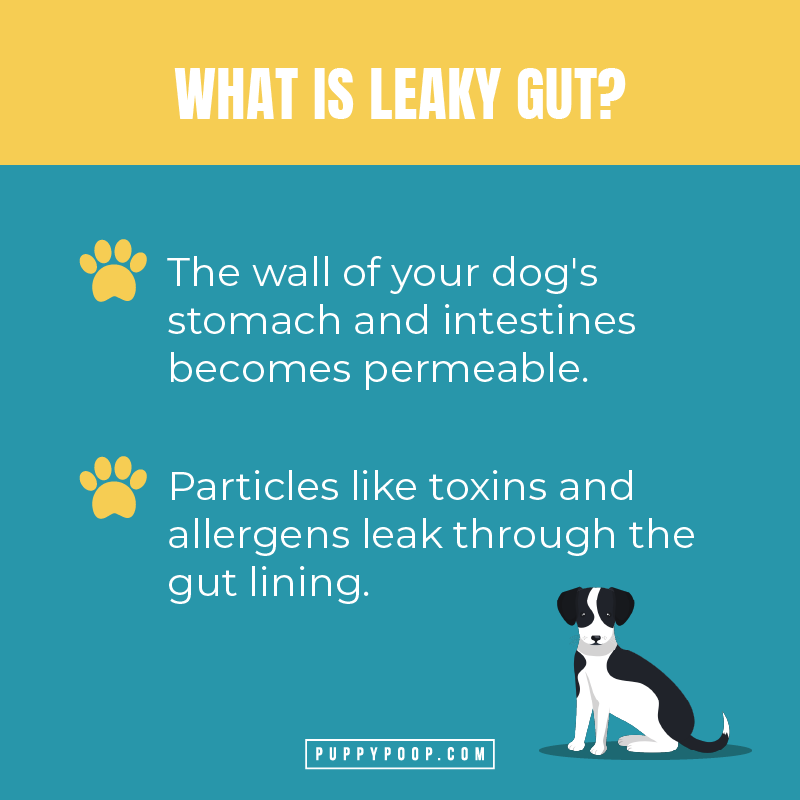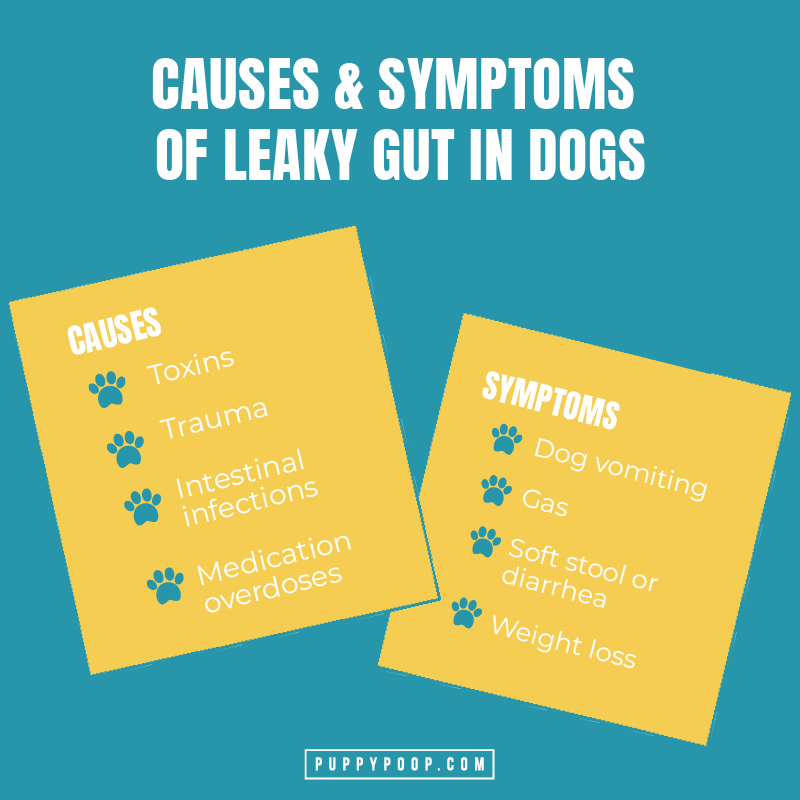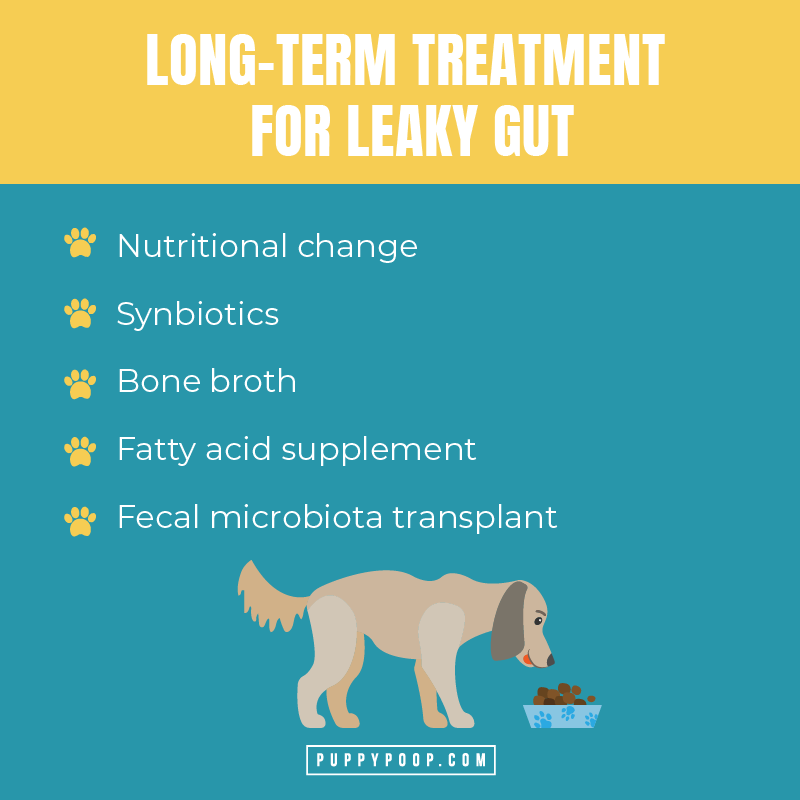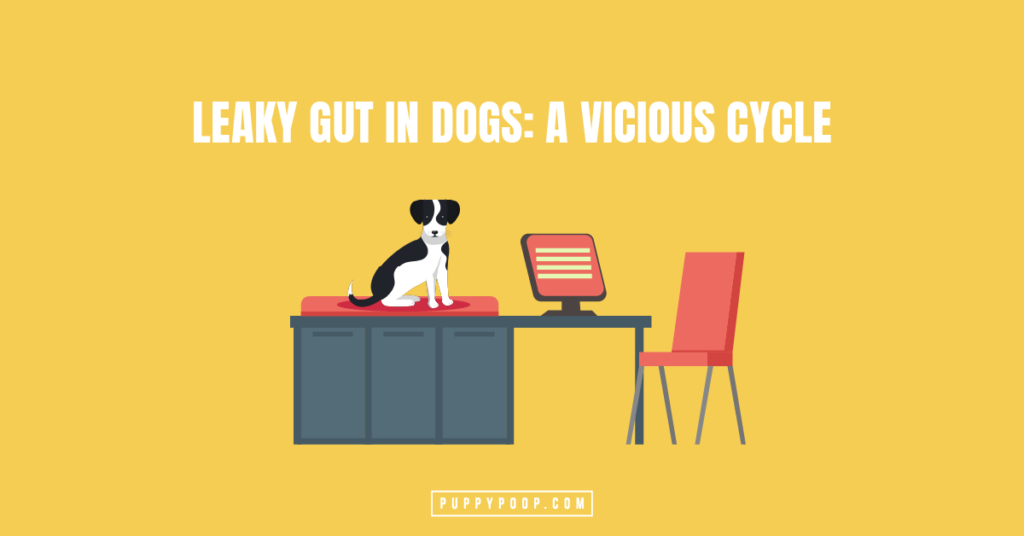Does your dog struggle with food allergies, skin issues, lethargy, or bouts of diarrhea or vomiting? If you answered yes to any of these, your dog may be experiencing leaky gut syndrome. Leaky gut can lead to many different illnesses in dogs. It is not a diagnosis but often is related to underlying disease and illness.
What is Leaky Gut?
The intestines digest and absorb nutrients, only allowing certain substances to enter the blood. Unfriendly bacteria, food allergens, and toxins can also be present in your dog’s gut. Your dog’s intestines, microbiome, and liver form a barrier against these harmful substances and undigested food particles.
What’s Happening Inside Your Dog’s Gut:
- The intestinal wall is selective in what it allows to get through into the bloodstream. The gut wall contains something called ‘tight junctions’ that create this barrier.
- The microbiome, or the normal gut bacteria in your dog’s GI tract, also plays a role in protecting your dog.
- The liver is the third line of defense. After the intestines digest food. Nutrients are absorbed into the blood. The liver then detoxifies the blood of harmful substances.

Leaky gut syndrome is due to increased intestinal permeability. It leads to substances like toxins and allergens entering the bloodstream. Permeability in the gut wall can occur if the tight junctions open up allowing many different particles through. The particles that leak through the gut lining trigger an immune response because the body sees them as ‘foreign’. The immune response leads to inflammation within your dog’s intestines and their body. When the gut lining becomes irritated and inflamed, the tight junctions become weaker. This allows even more undigested food and harmful substances into the bloodstream. The liver usually clears out these harmful substances from the blood. But, if too many escape into the blood, the liver can’t keep up and becomes overworked. The immune system will start the inflammatory process against these ‘invaders’. Leaky gut is a vicious cycle: inflammation leads to a leaky gut which leads to more inflammation
Causes of Leaky Gut
Leaky gut can be acute or chronic depending on the time frame of signs. Acute causes of leaky gut involve:
- Toxins
- Trauma
- Intestinal infections
- Medication overdoses
Chronic causes of leaky gut are often due to dysbiosis or bacterial imbalance. It occurs when the harmful bacteria outgrow the beneficial bacteria. Dysbiosis can lead to structural changes of the intestines and also affect the immune system function. Certain bacteria control the immune response. If these bacteria escape through the leaky gut wall, the immune response will be uncontrolled. This can lead to severe inflammation. Chronic leaky gut is also associated with food allergies, certain antibiotics, long-term NSAID usage, and over-vaccination. Highly processed foods can also lead to gut inflammation and affect the microbiome. These processed diets undergo high temperatures and contain more carbohydrates than dogs need.

Signs of Leaky Gut
Leaky gut causes digestive issues such as:
- Dog vomiting
- Gas
- Dog soft stool and dog diarrhea
- Weight loss
While these signs are worrying, leaky gut can have much greater impacts on your dog’s health. In people, leaky gut has been associated with inflammation and disease. These include: Inflammatory Bowel Disease, arthritis, inflammatory skin issues, liver disease, and pancreatitis. Many of these same inflammatory diseases occur in dogs too. Leaky gut can also lead to nutritional imbalances because it can affect absorption. Inflammation of the liver can occur because the liver works overtime to detoxify the blood. Because of the close proximity to the inflamed gut, the pancreas and liver can also become inflamed. Behavioral issues, like anxiety, aggression, and separation anxiety have also been associated with leaky gut.
Diagnosing Leaky Gut
Because leaky gut can occur due to other illnesses, your veterinarian may perform many tests to look for an underlying cause. Besides performing a thorough exam, their investigations may include:
- Fecal tests to check for any parasites
- General health blood work to assess organ function and look for any signs of infection
- Imaging. Radiographs or ultrasounds assess organ size and the health of the intestinal lining
- Specialized bloodwork: folate and/or cobalamin (vitamin B12) levels can look for deficiencies and help localize intestinal issues
- Biopsies of the intestines
How to Treat Leaky Gut in Dogs
Treatment of leaky gut focuses on reducing inflammation in the intestines. By reducing inflammation, the intestinal barrier will become more secure. This prevents unwanted substances from entering the blood. The treatment used will also depend on the cause of leaky gut and the severity of the signs.
If your dog has experienced severe diarrhea or vomiting, your veterinarian will stabilize your dog with fluids. Medications, depending on the cause of leaky gut, will be needed. For instance, antimicrobial trials, with metronidazole or tylosin, may be started. Other medications, like NSAIDS, may be discontinued because they can cause further damage to the gastrointestinal tract.

Some other long-term treatment options include:
- Nutritional change. A hypoallergenic diet trial can help to rule out any food allergies your pet may have. A long-term ideal diet would involve more whole foods and less processing.
- Synbiotics. Supplements containing probiotics and prebiotics can help restore the natural gut biome. Synbiotics can also help support the immune system to help regulate the inflammatory response.
- Bone broth contains a high amount of glycine, which aids digestion. It also helps to support growth of beneficial gut bacteria.
- Fatty acid supplement. Omega-3 supplements, like fish oil or egg, can help reduce inflammation.
- Fecal microbiota transplant. In humans, fecal microbiota transplant has been efficacious in chronic digestive issues. While not the first mode of treatment for dogs, it is being used more often.
Stress can play a major role in your dog’s gut health.
There are various kinds of stress that play a role in your dog’s gut health. Reducing these stressors may help improve their gut health:
- Physical stress occurs with over-exercising your dog.
- Emotional stress often involves situations where your dog feels uncomfortable. Some dogs have anxiety when left alone, going to the vet, or being around other dogs. It’s always best to socialize them early on in life but you can also introduce them to these new things slowly. This will make them more comfortable in these situations over time.
- Nutritional stress from certain foods and medications. Grains, preservatives and Non-steroidal anti-inflammatory medications can all lead to gastrointestinal stress.
- Environmental stress: exposure to chemicals or cleaners
Now What?
Leaky gut may not be something that you immediately think of if your dog has digestive issues. It may not even cross your mind if these digestive issues occur on and off over time. Don’t worry though, you may still be able to get ahead of these more chronic digestive diseases!
If your dog has leaky gut, or you suspect your dog may have leaky gut, the best thing you can do is to detail their digestive issues. This includes stool photos, food reactions, or other symptoms. Keeping a diary of your dog’s bowel habits can alert you to trends. It may also help you avoid flare-ups in the future. It’s best to give your veterinarian the most information possible. This will allow them to make the best diagnosis and management decisions for your dog. Leaky gut can be frustrating for both you and your dog. But monitoring their stools will make things more manageable.
Get the DIG Labs App
Download the free DIG Labs Digestive Health Tracker to get personalized insights and recommendations for your dog based on their stool.

